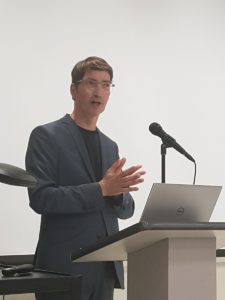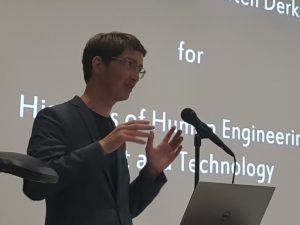
Derksen wins prestigious prize
In June, dr Maarten Derksen received the prestigious Cheiron book prize for his Histories of Human Engineering (published in 2017 by Cambridge University Press). Cheiron is the international society for the history of behavioural and social sciences. According to the jury, Derksen’s book “rose to the top in a field of candidates that was rich with excellent and interesting work.” And Mindwise was present in Akron, Ohio, when he accepted his prize. What follows is the text of his acceptance speech (with some links added), which has been shared with his permission. -eds.
One of the many flaws in my character is that I’m really bad at accepting compliments. My usual response is to argue back and say something like “it’s nothing really” or “actually I think I could have done this or that better.” It’s bad manners, and I’ll resist doing so on this occasion and I’ll just say that I am really very, very happy with this prize and the acknowledgement that it represents. To be told by such an eminent group of peers that my book is worth reading means a lot to me.
A book is a very slow and indirect way of communicating your ideas. After my book was published there was a silence. I had no idea whether people were actually reading my book, let alone what they thought of it. My audience was an abstract, foggy entity. Perhaps there was no audience. When one day, out of the blue, I received an email from David Robinson that I had been awarded the Cheiron book prize, it was as if someone suddenly shouted in my ear, with a bull horn, “great book!” It was an interesting start of the day.
As an aside: we academics cite each other a lot, but we don’t tell each other often enough what we think of each other’s work, at least not if we don’t know each other personally. Next time you read a book or a paper that you like, by an author you don’t know, tell them. Send them an email. I think we need conversations like that. Academia can be a lonely place. Perhaps more contentiously: if you don’t like that book or that paper, tell them too. (Referring back to yesterday’s panel discussion: do not be supportive and positive at all cost. We like to form mutual admiration societies, but that’s not always productive.)
I was asked to say a few things about the book.
Basically, I think you’ll just have to read it, but I’ll say a little about how it came to be. (A bit of developmental biography, perhaps, as Paul Croce would call it.)
When carving out a topic, a historian is always a bit hampered (I am at least) by the very historicity of the thing that one is studying. What is that thing? You have to study some thing, but who am I to say what it is? You want to avoid presentism as much as possible, but you have to start somewhere.
You want to define your topic, but you don’t want to be so definite that you smother all the history of it.
This problem is particularly acute if you assume that not only does society have a history, so does the subject.
My colleague and friend Douwe Draaisma was once asked by a PhD student what he was writing about and he said “memory,” and she said “What is that?” And he was a bit taken aback, and he said “Well, you know, remembering things,” and she said something like “How do you know that that’s what it is?”
It sounds like a silly question, but it’s not easy to answer. I’m not saying there are no answers, but they’re not easy to find.
Years ago, long before I had the book contract, I became interested in the question whether the practical application of social science is a form of technology. And if so, why we don’t call it technology. (Because usually we don’t.) Why is there no social technology, I wondered.
Then one day I had a conversation with Anne Beaulieu, who is an ethnographer (and also my wife) and she asked me what I was working on and I said “social technology” and she said “I’m working on that too” and we decided to work on it together. Very soon however it turned out that she meant something different than I did. She was talking about things like Facebook and Twitter. (When the term “social technology” is used nowadays, it is usually for social media like that.)
However, common to both our notions of “social technology” was an interest in the intersection of technology and the social. We managed to turn this into a collaborative project, and that’s how my exploration of “social technology” began. And the more we looked into that intersection between technology and the social, the more diverse, changeable and contested it turned out to be. Things happened there.
For example, one day Anne and I were talking with a colleague, a sociologist of science, and she asked us what we were working on, and we said “social technology,” and she said “Isn’t all technology social?”
In STS (science and technology studies) this has become a widely shared sentiment; a cliché even. And there is a lot of truth in it: what we call society is technological down to its core. The associations between humans are unthinkable without the support of non-humans, to put it in Latourian terms, and vice versa all technology has human relations built into it. (For that reason, hard core Latourians will not speak of “society,” but rather of “collectives.”)
And yet this cliché, “all technology is social,” did not satisfy me. It papers-over interesting differences. Psychotherapy is a different kind of technology than chemotherapy, it seemed to me. My intuition was that that difference had to do with a certain kind of tension or friction between technology and the social.
I wanted to investigate that tension.
When I was exploring that notion of “social technology,” someone sent me an article, published in 1901, by a guy called Charles Henderson, titled “The scope of social technology.” I didn’t know Henderson, the paper looked really boring, and I put it aside. (Sometimes I’m not a good historian.) When half a year later I looked closer, I realised it was really important. The notion of “social technology” itself had a fascinating history.
Henderson was a Baptist minister and a sociologist who worked in the University of Chicago Sociology department, under Albion Small (the pioneer of American sociology). The term “social technology” was probably Small’s idea (although there are precursors in German sociology, there are very tricky translation issues here). But it was Henderson who defined it, in his paper.
In short: “social technology” was the theory of the application of sociological knowledge. It was applied sociology, and the goal was social reform on a scientific basis. (Evidence-based social reform, we might call it nowadays.) To Small and Henderson, it was an alternative to socialism (understandable but dangerous) on the one hand and the social reform efforts of the American Social Science Association. The latter were not sociologists, in Small’s opinion, because their approach was entirely empirical, not guided by theory (i.e. social technology). There is a lot of boundary work going on here.
So social technology was the theoretical basis of social reform. The reform itself was a matter of “technique,” to be left to men and women with practical experience.
Intriguingly, this term “social technology” did not survive the demise of Small’s school of sociology (what we call the “Chicago school” was the work of his successors, like Burgess and Park). Instead, in the Machine Age of the 1920s and 1930s people spoke of “social engineering” and that remains a much more common term than “social technology.”
I also realised (rather late) that the term “technology’ itself needed to be historicized.
What Small and Henderson called “technology” was after all the theory of application, whereas what we call “technology” is usually the applications themselves, and in particular devices, machines, artefacts. The change start to happen in the 1930s. In my book I argue (perhaps speculate is a better word) that that change to “technology as devices” led to the demise of the term “social technology,” because we like to see the social as something other than machines. This early history of the term is now one of the chapters in my book.
So this concept of “social technology,” became topic for me, not resource. I was still interested in what I saw as a tension between technology and the social, but both terms were too much burdened with their own history to serve as framework for my studies.
Instead, I turned to the concepts of control and resistance, which I had worked with before. A theme started to take shape: on the one hand, mechanical, calculable, efficient and effective control over people is an ideal that some find worth striving for. “Social engineering” had many proponents in the interbellum. It promised a better society. For many others, on the other hand, it is a nightmare. Control is sought after and resisted. So if you seek control, I argued, you need to take that resistance into account.
(If resistance is possible, that is. If resistance is not possible, we don’t speak of control, but of violence. Foucault makes this distinction somewhere: power (control) is exercised over free individuals, otherwise it’s not power, but violence.)
But if resistance is possible, control has to be hidden, or made acceptable. You need to be tactful, otherwise your engineering will not work. I started looking at all the ways in which strategies of control are combined with a “human touch,” or simply hidden, and at the ways they are adapted to specific situations, and specific individuals.
With these three concepts (control, resistance, and tact), I finally had a container that would fit a wide range of related issues and cases, and still allowed them room to move. I could connect Dale Carnegie, Karl Popper, and Lillian Gilbreth in the same story, and they could still be their particular, very different selves. Kurt Lewin was not into brainwashing, but in both cases the dynamic of control and resistance and the tact it calls for is a central concern.
(One of the most enjoyable finds was that in the various brainwashing practices of the 1950s you see elements of tact. And the reason for that was that for instance Chinese thought reform ultimately aimed at the voluntary, sincere adoption of the proper ideology. It all happened in a context of coercion, of course, but the final step, adopting the new ideas, had to be taken by the victim. And to get them there required tact.)
What these three concepts also allowed is to look at how subjectivity is enacted in this dynamic. In attempts at control, in the resistance against them, and in the tact that is employed to overcome or accommodate that resistance forms of subjectivity are performed, ways of being human. And as far as resistance and tact are concerned, being human is often “not being a machine.”
(Attentive readers might note that the chapters on “social technology” and on Popper are outliers, because they don’t talk about tact.)
Thus the book took shape. Now that it is finished, I can allow myself to look over the edges of that container that I used to define and demarcate my histories.
Is control such a universal desire as I assumed it to be? Does control always provoke resistance? And what would happen if instead of control one took “care” as the central term?
But these are questions, perhaps, for another book.
Thank you.





